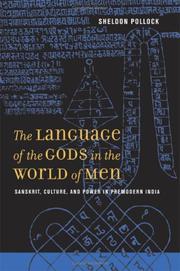| Listing 1 - 2 of 2 |
Sort by
|
Book
ISBN: 1782974180 1782974164 9781782974161 1782974156 9781782974154 9781842173855 1842173855 9781782979395 9781785707568 9781789252828 1782970444 1782970428 1782979395 1785707566 1789252822 9783948791445 3948791449 1789252830 1789252857 1785707574 1785707590 9781782970422 9781782970446 9781782970439 9781785707599 9781785707575 Year: 2017 Publisher: Oxford
Abstract | Keywords | Export | Availability | Bookmark
 Loading...
Loading...Choose an application
- Reference Manager
- EndNote
- RefWorks (Direct export to RefWorks)
Puspika 2 is the outcome of the second International Indology Graduate Research Symposium and presents the results of recent research by young scholars into pre-modern South Asian cultures with papers covering a variety of topics related to the intellectual traditions of the region. Focusing on textual sources in the languages in which they were composed, different disciplinary perspectives are offered on intellectual history, linguistics, philosophy, literary criticism and religious studies.
Indic literature --- East Indian literature --- Indian literature (East Indian) --- Indo-Aryan literature --- History and criticism --- India --- Antiquities --- Indic literature - To 1500 - History and criticism - Congresses --- History --- Study and teaching --- Bharat --- Bhārata --- Government of India --- Ḣindiston Respublikasi --- Inde --- Indië --- Indien --- Indii︠a︡ --- Indland --- Indo --- Republic of India --- Sāthāranarat ʻIndīa --- Yin-tu --- インド --- هند --- Индия --- History and criticism.

ISBN: 0520245008 9780520245006 9780520260030 0520932021 1282357743 9786612357749 1601293844 Year: 2006 Publisher: Berkeley: University of California press,
Abstract | Keywords | Export | Availability | Bookmark
 Loading...
Loading...Choose an application
- Reference Manager
- EndNote
- RefWorks (Direct export to RefWorks)
In this work of impressive scholarship, Sheldon Pollock explores the remarkable rise and fall of Sanskrit, India's ancient language, as a vehicle of poetry and polity. He traces the two great moments of its transformation: the first around the beginning of the Common Era, when Sanskrit, long a sacred language, was reinvented as a code for literary and political expression, the start of an amazing career that saw Sanskrit literary culture spread from Afghanistan to Java. The second moment occurred around the beginning of the second millennium, when local speech forms challenged and eventually replaced Sanskrit in both the literary and political arenas. Drawing striking parallels, chronologically as well as structurally, with the rise of Latin literature and the Roman empire, and with the new vernacular literatures and nation-states of late-medieval Europe, The Language of the Gods in the World of Men asks whether these very different histories challenge current theories of culture and power and suggest new possibilities for practice.
Sanskrit literature --- Indic literature --- Politics and literature --- Literature and society --- Political aspects --- History and criticism --- History --- History. --- Political aspects. --- History and criticism. --- Literature --- Literature and sociology --- Society and literature --- Sociology and literature --- Sociolinguistics --- Social aspects --- Literature and politics --- East Indian literature --- Indian literature (East Indian) --- Indo-Aryan literature --- Smṛti literature --- Sanskrit literature - To 1500 - Political aspects --- Sanskrit literature - To 1500 - History and criticism --- Indic literature - To 1500 - History --- Indic literature - To 1500 - Political aspects --- Politics and literature - India - History. --- Literature and society - India - History
| Listing 1 - 2 of 2 |
Sort by
|

 Search
Search Feedback
Feedback About UniCat
About UniCat  Help
Help News
News